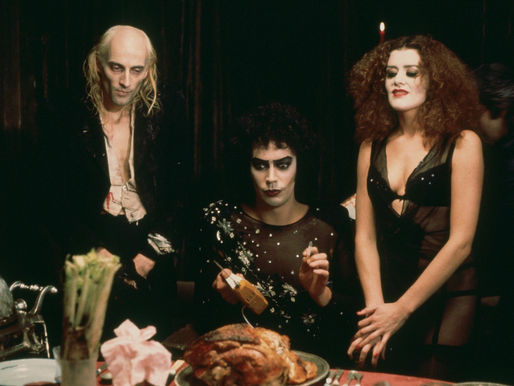top of page
Search
Golden Age Brits
Articles relating to British talent within the film Industry.
Including, Actors, Directors, Writers etc


The Great Dictator (1940)
The Great Dictator marks a seismic moment in cinema history: Charlie Chaplin’s first full sound film, and one of the earliest and most daring direct attacks on Adolf Hitler and fascism — released while the United States was still officially neutral in World War II. A dark political satire and social parable wrapped in comedy, the film is both a bold denunciation of tyranny and a plea for human decency.

Soames Inscker
5 min read


Modern Times (1936)
Modern Times is a masterpiece of satire, physical comedy, and social commentary. Written, directed by, and starring Charlie Chaplin in his final performance as the iconic Little Tramp, the film is both a farewell to the silent film era and a scathing critique of industrialization and capitalism during the Great Depression.

Soames Inscker
5 min read


The Three Musketeers (1973)
Richard Lester’s 1973 adaptation of The Three Musketeers is one of the most energetic, irreverent, and stylish takes on Alexandre Dumas’s classic novel ever put to screen. Blending period-authentic detail with slapstick humour and modern wit, this version offers a refreshing departure from the more stately or romanticized adaptations that preceded it.

Soames Inscker
4 min read


Willow (1988)
Willow is a high fantasy adventure from the late 1980s that was part of a larger wave of sword-and-sorcery epics inspired by the massive success of Star Wars and The Lord of the Rings. Conceived by George Lucas and brought to life by Ron Howard, Willow occupies an intriguing niche between mythic heroism and light-hearted family entertainment.

Soames Inscker
5 min read


Brannigan (1975)
Brannigan is a fascinating cultural artifact—an attempt to repackage the quintessential American cowboy hero, John Wayne, into the mould of a modern urban cop thriller set in 1970s London. Directed by Douglas Hickox and produced in the wake of Dirty Harry and The French Connection, the film represents both a genre experiment and a late-career pivot for its iconic star.

Soames Inscker
4 min read


The Titfield Thunderbolt (1953)
The Titfield Thunderbolt is a whimsical and affectionate British comedy produced by Ealing Studios, best known for their run of clever, character-driven post war satires. Released in 1953 and inspired by the real-life story of villagers in Cambridgeshire who fought to save their branch line (the first to be operated by volunteers), the film celebrates community spirit, individual initiative, and the enduring romance of the railway age.

Soames Inscker
5 min read


Passport to Pimlico (1949)
Passport to Pimlico is one of the standout entries in the golden era of Ealing Studios comedies, a post war British film institution known for its dry wit, ensemble casts, and uniquely British sense of humour. Released in 1949, this film delivers a delightful mix of absurdism, satire, and social commentary, rooted firmly in the trials and tribulations of post war British society.

Soames Inscker
5 min read


Dunkirk (1958)
Dunkirk (1958) is a sombre, character-driven war film depicting the British Army’s retreat and evacuation from Dunkirk, France, in 1940. Released nearly two decades after the actual events, it is one of the first major cinematic attempts to portray Operation Dynamo—the massive, hastily-organized evacuation effort that saved over 330,000 Allied troops and became a defining moment of British WWII history.

Soames Inscker
5 min read


633 Squadron (1964)
633 Squadron is a 1964 British war film that dramatizes the perilous missions of an elite RAF fighter-bomber squadron during World War II. Loosely based on real RAF operations, the film follows a fictional campaign involving daring low-level attacks against Nazi fortifications in Norway, particularly a heavily guarded munitions plant vital to Germany’s war effort.

Soames Inscker
5 min read


Wait Until Dark (1967)
Wait Until Dark (1967) is a tense, tightly constructed psychological thriller that transforms a small Greenwich Village apartment into a claustrophobic battleground between vulnerability and menace. Adapted from Frederick Knott’s stage play and directed by Terence Young (best known for early James Bond films), the film is a masterclass in suspense that weaponizes darkness, silence, and perception in ways that were ground-breaking at the time—and remain effective today.

Soames Inscker
5 min read


The Invisible Man (1933)
The Invisible Man (1933), directed by James Whale, is a foundational work of both science fiction and horror cinema. Adapted from H.G. Wells’s 1897 novel, the film was part of Universal Pictures’ ground breaking cycle of horror films in the early 1930s, alongside classics like Dracula (1931), Frankenstein (1931), and The Mummy (1932).

Soames Inscker
4 min read


The Innocents (1961)
The Innocents (1961) is widely regarded as one of the finest psychological horror films ever made. Adapted from Henry James’s ambiguous and haunting novella The Turn of the Screw, the film transforms a tale of ghostly suspense into a profoundly unsettling exploration of repression, innocence, madness, and the blurred boundaries between the supernatural and the psychological.

Soames Inscker
4 min read


The Cannonball Run (1981)
The Cannonball Run is a film that thrives on energy, absurdity, and pure unadulterated fun. Directed by former stuntman Hal Needham, the movie is an ensemble comedy inspired by the real-life Cannonball Baker Sea-To-Shining-Sea Memorial Trophy Dash—an illegal cross-country car race conceived by automotive writer Brock Yates.

Soames Inscker
4 min read


Sir Alec Guinness
Sir Alec Guinness (born April 2, 1914 – died August 5, 2000) was a British actor of immense range and grace, known for his chameleonic performances, quiet dignity, and the ability to convey deep emotion with the subtlest gestures. Over a career spanning six decades, Guinness mastered everything from Shakespearean drama to Ealing comedies, historical epics, and science fiction.

Soames Inscker
4 min read


Peter Sellers
Peter Sellers (born Richard Henry Sellers on September 8, 1925 – died July 24, 1980) was a British actor, comedian, and master of disguise whose transformative abilities and impeccable timing made him one of the most acclaimed and complex comic talents in film history. Renowned for his ability to disappear into roles, he became famous for portraying multiple characters within the same film — often so convincingly that viewers forgot they were watching a single performer.

Soames Inscker
4 min read


Murder By Death (1976)
Murder by Death is a genre-savvy spoof that brings together caricatures of the world’s most famous fictional detectives — thinly veiled versions of Hercule Poirot, Miss Marple, Sam Spade, and Charlie Chan, among others — and places them in a haunted mansion for a mysterious dinner party. The film was penned by the legendary playwright and screenwriter Neil Simon, known for his sharp wit and theatrical flair.

Soames Inscker
4 min read


The Return of the Pink Panther (1975)
After a decade away from the role, The Return of the Pink Panther marked the triumphant comeback of Peter Sellers as the bumbling, absurdly self-confident Inspector Jacques Clouseau. It was also a revival for the franchise itself, which had faltered slightly after the 1964 hit A Shot in the Dark and the Sellers-less 1968 film Inspector Clouseau.

Soames Inscker
4 min read


Tommy (1975)
Tommy is a surreal, audacious rock musical directed by the flamboyant British auteur Ken Russell, based on The Who’s 1969 concept album of the same name. The film is a psychedelic fever dream, built entirely around music and image rather than traditional dialogue or narrative structure. With its star-studded cast and genre-defying ambition, Tommy is both a product of its time and a lasting artifact of cinematic and musical experimentation.

Soames Inscker
4 min read


The Rocky Horror Picture Show (1975)
The Rocky Horror Picture Show is a transgressive, irreverent, and gloriously bizarre musical comedy-horror film that quickly outgrew its modest box office beginnings to become the ultimate cult classic. Based on the 1973 British stage musical by Richard O’Brien, the film is a madcap tribute to B-movies, sci-fi serials, glam rock, and sexual liberation.

Soames Inscker
4 min read


Monty Python and the Holy Grail (1975)
Monty Python and the Holy Grail is a comedic tour de force that turns the medieval legend of King Arthur into a gleefully absurd farce. Directed by two of the Monty Python troupe’s key members — Terry Gilliam and Terry Jones — and performed by the entire group in multiple roles, the film is a subversive, self-aware parody of chivalric myths, storytelling conventions, and historical epics.

Soames Inscker
4 min read
bottom of page


